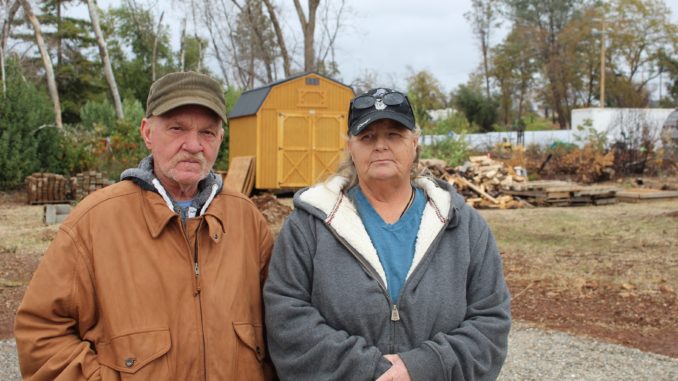
Cinda Larimer has been living with her boyfriend, son and animals in two RVs on a friend’s property in Magalia while gearing up for their return to Paradise, where she’d lived for over 20 years. It’s been a bumpy road for the family, which has experienced setback after setback when it comes to their recovery from the 2018 Camp Fire.
Larimer and her family, who were renters before the fire, purchased a plot of land in Paradise after the disaster. She expected to move one of the RVs to her property months ago and live in it while working with various companies to find the right shipping container home to purchase. But instead, she’d been jumping over hurdles to get her property cleared for habitation by the town of Paradise, she told the CN&R. Recently, she was denied a temporary use permit and told by the town that she can’t live there in an RV.
The septic system has to be completely replaced, but she cannot afford the $15,000 price tag. Her family of three is on a limited income and awaiting a settlement from Pacific Gas & Electric. If she moves to the property without replacing the waste system, she risks being cited and fined. However, her family can no longer stay with her friend, who is moving forward with their own rebuild plans.
The town and Butte County have been flexible with their land-use ordinances in order to help survivors rebuild, but things are changing as the third anniversary of the blaze approaches. In August, town officials enacted policies geared toward phasing out the use of RVs, one of the primary sources of shelter for many victims of the mega-blaze. As a result, some residents will have to plead their case to be allowed to stay on their property without facing fines. Additionally, the Butte County Board of Supervisors is considering no longer allowing residents to live in RVs without hookups to all utilities (also known as dry camping).
Recovery in the wake of the fire has been impeded by myriad factors, but the barriers are especially difficult to navigate for the poorest survivors. While victims of all income levels await PG&E settlements to help them rebuild—a challenge in itself amid costs inflated by the pandemic—many low-income individuals have spent the last three years living on the edge. Disaster case managers are working with the most vulnerable populations—such as seniors, single parents with children, and those with disabilities—and say that they need more time to help these households before they are fined for being on their own properties.
Larimer is frustrated. She told the CN&R she feels her family has done as much as they can to comply—they have power, water and garbage set up. Because she cannot afford to install septic yet, she has been paying for a portable toilet service on the days they come to work on the property.
Her family will be forced to live on their property illegally, Larimer said. They have no other choice.
“We will be homeless again if we don’t move to the property that we own,” she said. “I have nowhere else to go.”
‘One last effort’
The Paradise Town Council meeting on Aug. 10 was packed. Residents, some with tears in their eyes, pleaded with the panel for an extension of an urgency ordinance that would allow RV dwellers to continue living on their property without a rebuild permit. It was set to expire at the end of this year, but the town extended it through April 2023 for those with no code violations as of Sept. 30.
That night, the town also relaxed requirements that residents prove they are moving forward on a rebuild, which many folks had yet to meet for various reasons, including financial barriers and delays due to labor and material shortages. However, Paradise also clamped down on code enforcement, adding a provision that two notices of violation within a year or two citations for a single violation could be grounds to revoke someone’s permit, even if they correct the issue.
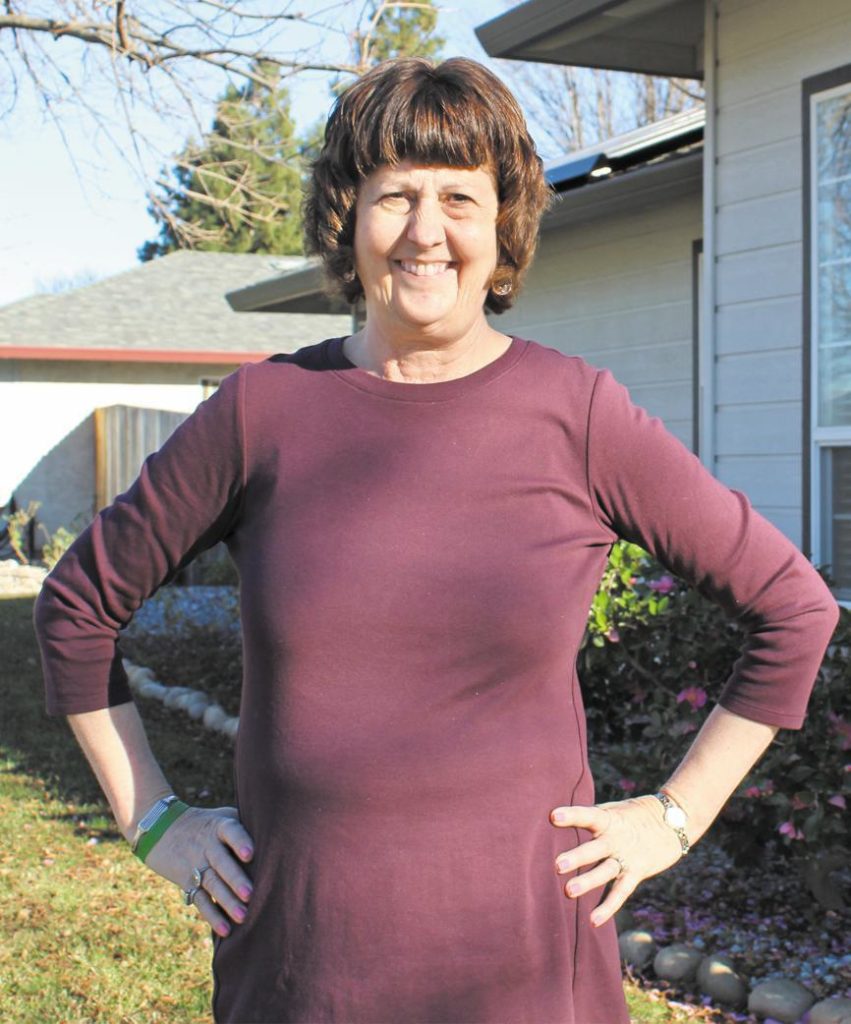
It was a victory for some—those who have all utilities hooked up and had been issued a temporary use permit (which is separate from the rebuild permit). For those living unpermitted, the council created an exceptions committee (at its Sept. 14 meeting). It will review the cases of these folks, who will need to show that they are working toward compliance. Vice Mayor Jody Jones and Councilman Steve “Woody” Culleton will serve on the committee, which has the authority to unanimously deny applications and must send all other recommendations to the full council for approval. The Town Council will discuss the criteria for exception applications at its meeting Tuesday (Nov. 9).
Per the council’s Aug. 10 vote, after April 2023, those living in RVs will also have to have a rebuild permit. Town officials have made it clear that they don’t intend to add any additional RVs as primary residences. (The town still issues temporary use permits to returning residents, but now they must also have a rebuild permit issued to qualify, according to Susan Hartman, Community Development Director of Planning & Wastewater.)
Jones told the CN&R that the town adopted such policies to meet health and safety standards. The primary code enforcement issue comes from properties that aren’t connected to a septic system, which is “not sanitary for [the residents] or the people living around them.”
“The thinking there is it’s been three years. If you’re not already in town with an RV, you found somewhere else to live. We don’t want the town to become a campground. That’s not part of the rebuild plan,” she said during a telephone interview. “I think that we’re being fair and generous with the timeframe going to 2023, and we’re trying to accommodate all the people that are in RVs [who] are following the rules.
“We don’t want to kick people out who are doing the right thing and coming back to Paradise—we want them to be able to rebuild.”
Meanwhile, the Board of Supervisors chose to extend its own urgency ordinance by one year (through Dec. 2022) for county residents impacted by the Camp Fire who have a temporary use permit and are connected to utilities. Dry campers, however, could be cited and fined beginning in January.
The supervisors will be exploring the topic at a future meeting. There was unanimous support from the board to ask county staff to reach out to the North Valley Community Foundation, which has managed millions of dollars in charitable donations to help with Camp Fire recovery, to see if it can assist people with barriers such as utility hookups.
Supervisor Doug Teeter, whose district encompasses Paradise, made the proposal. He told the CN&R that this provision of the ordinance needs to expire at some point in order to get “bad actors” out—the county has struggled with individuals who have been living on other people’s properties without permission.
“The unfortunate side is maybe some good actors are going to be affected, but no matter what, getting those things done, getting a temporary power pole, getting their septic hooked up … those things are going to have to get done to rebuild anyhow.”
Teeter added that he sees a partnership with NVCF as “one last effort, or another effort, to find out what issues they’re having … and how can we move them to temporary status.”
Pressing needs remain
Larimer, who delivered newspapers for the Paradise Post, lost her job after the fire. She picked up a pizza delivery job but was let go again when disaster clean-up crews left town, she said.
She and her boyfriend, Charles Panell, who is retired, make welded artwork—peace signs and birds of paradise—and that has helped supplement their limited income. Larimer has tried to find more stable work, but she suffers from chronic illnesses that make securing employment difficult.
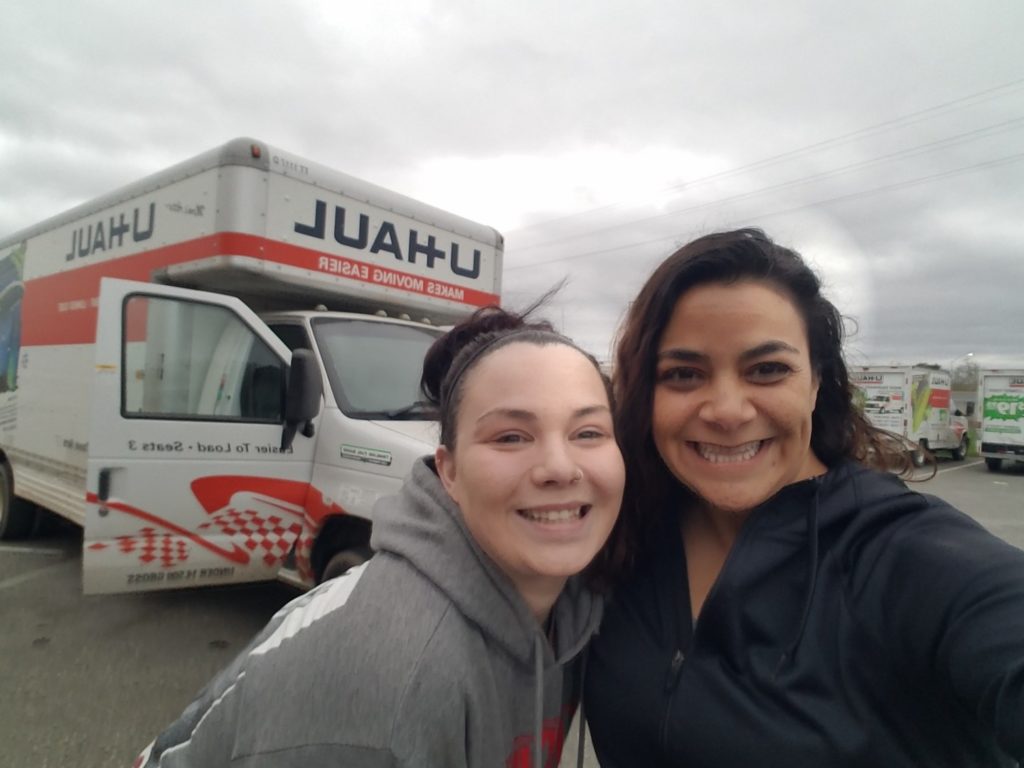
“I’ve been through hell in so many different ways after the fire,” she said. “We’ve struggled for three years and continue to struggle.”
Larimer doesn’t qualify for many helper programs—take, for example, one established by the town to repair and replace septic systems; it’s only for those who owned the property at the time of the fire. To add to her plight, she did not receive a disaster case manager until two and half years after the fire due to a long wait-list.
She’s not alone.
In February 2019, Erin Kennedy was hired as director of case management for the Boys & Girls Clubs of the North Valley. The nonprofit created her position to respond to the dire need in the wake of the Camp Fire and help survivors one-on-one. Since then, her team has grown—she wrote grants to get two more full-time case workers—and these days they’re busier than ever. They have helped approximately 31 people rebuild their homes, 26 individuals resettle inside of the burn scar and 21 relocate elsewhere.
Currently, Kennedy and her team are assisting 104 people. These individuals are the most vulnerable, she said, with many barriers impeding their recovery and rebuild progress. One such client is a senior who has no telephone or internet service and lives in a remote part of the county; Kennedy said, she communicates with her case manager via letters.
These clients are low-income and either had no insurance or very little, she added, and it’s nearly impossible to find programs to help them financially.
One program that can provide some relief, Kennedy mentioned, offers grants of up to $200,000 to single-family or mobile home owners. The ReCover California program is designed to cover unmet needs if insurance, Small Business Administration loans, Federal Emergency Management Agency aid, legal settlement and other resources did not fully cover the cost of rebuilding a home. However, the program didn’t start accepting applications until this July.
Plus, renters don’t qualify. The state has allocated $55.9 million toward the construction of affordable rental housing in Paradise via federal Community Development Block Grant-Disaster Recovery funding, intended to reimburse the town and housing developers for costs incurred while creating multi-family housing. These rentals have yet to be built, however. In fact, the application deadline for these projects isn’t until Dec. 31, 2022, and the program doesn’t require a certificate of occupancy for those units until May 31, 2026.
Because of these barriers, many are banking on their PG&E settlement.
Waiting for a lifeline
Joe Earley, a Paradise attorney who lost everything in the Camp Fire, has been representing survivors in the legal battle with PG&E for nearly three years. To this day, many who are depending on their settlement to rebuild have yet to hear a word from the Fire Victim Trust on what they might receive. The court-appointed trust was formed after PG&E’s bankruptcy proceedings were finalized to evaluate, administer, process and resolve claims.
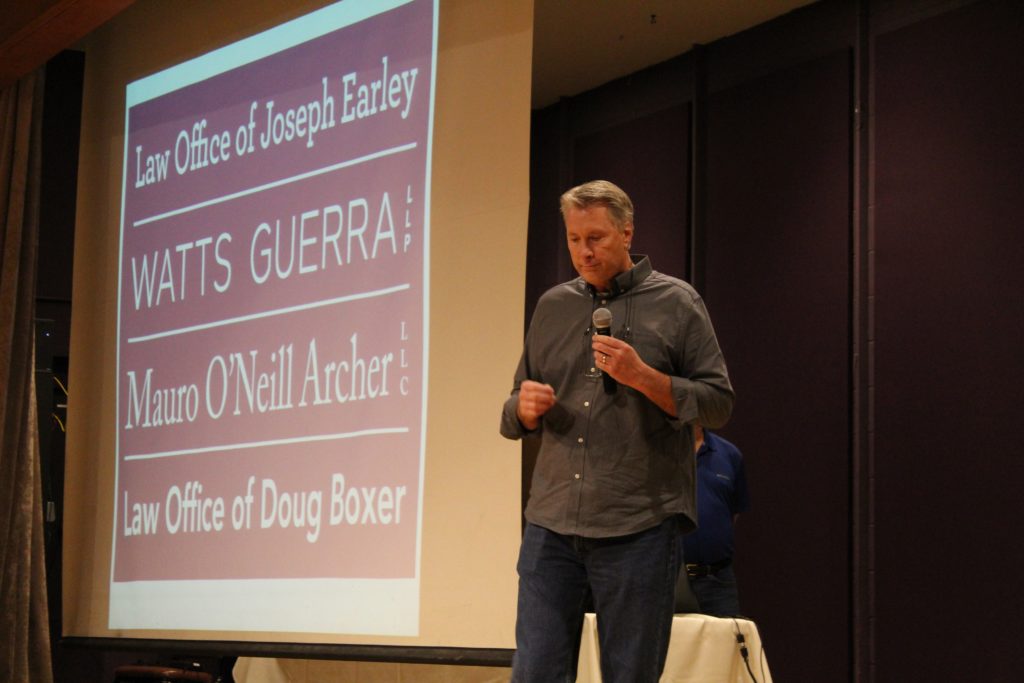
Earley’s family has been able to temporarily resettle in Chico until they can afford to rebuild in Paradise. It’s where he’s relocated his office, too. But many of his clients aren’t as fortunate, he said. Earley has helped several of them apply for their cases to be reviewed by the Fire Victim Trust sooner due to extreme hardship, but that process hasn’t been as effective as he’d hoped.
“All I know is there are a lot of people who aren’t helped fast enough, and they’re in desperate homeless situations,” he said.
In the meantime, Kennedy is concerned for the folks living on the margins. Code enforcement fines from the town or county could put them into greater debt and deplete their already limited financial resources, she said. Then, when they are able to rebuild, they’ll potentially have property liens, which “ultimately keeps them in the situation they in.”
“I think everybody needs more time at this point,” she said. “Give people the time that they need to A) heal; and B) figure out what’s next; and C) if they’re waiting on settlement money, let them get settlement money before you start fining them to live on their own property.”
As for Larimer, she is among those counting on PG&E settlement money to help her family rebuild. In addition to replacing her septic system and getting a shipping container home in place, she wants to plant a vegetable garden and some fruit trees, and have a tiny patch of grass for her dog to enjoy out front.
She said her family will have to proceed with the exceptions committee route and plead their case and hope that the town will hear them out. It’s their last option.
“It’s been a hell of a fight, and I’m tired,” she said. “We should be able to move to our property and be able to live there until we can afford to rebuild, but that’s not how it’s
working.”

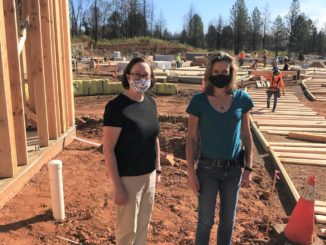
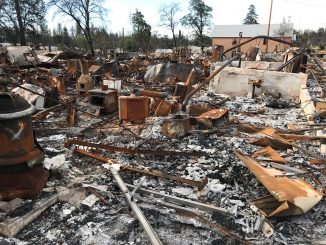
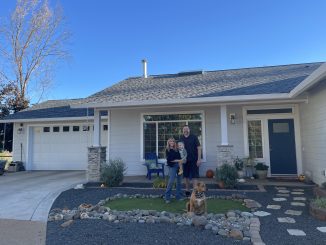
Be the first to comment